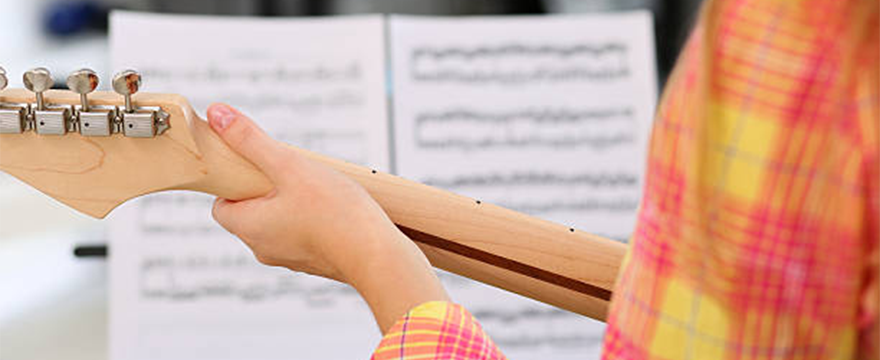Learning the guitar is all about physical skill development. That means being able to move physical, visual and auditory ideas from conscious thought to unconscious processing. When done efficiently, this will not only be a fun experience, but it will be a smooth process as well…
Q: DO YOU HAVE ANY TIPS FOR BEGINNERS?
I am a beginner at guitar and I feel that I need a short breakdown that covers how beginners should think about and approach a daily practice routine. I feel like I just don’t know what to practice and so I get really distracted.
I also would like to know what kind of length of time I should expect to work on practicing guitar until a day finally comes where my technique at playing it is what would be considered competent.
– Oliver, Baltimore, MA.
A: Thanks for writing in! When getting into the practice of guitar there are several phases that players tend to go through. It takes at least a year to fully integrate being comfortable with the instrument in a variety of ways as well as getting used to practice on a daily basis.
After that period, it may take another year after that to integrate control over musical ability, (rhythm, music theory, song learning /performing skills, etc.).
THREE PHASES OF LEARNING GUITAR:
The learning curve for guitar is fairly lengthy. It can take a very long time to get to a good level of knowledge and skill. There are however several learning phases that a player should be aware of.
PHASE ONE: GETTING THE FEEL DOWN
When players first pick up a guitar it may feel like a foreign object. But, since the guitar is such a personal instrument, and it is held so close to the body, there needs to be a sense of comfort established with it.
To achieve this, hold it often, play it in different areas of your home and sit in several of the standard seating positions with it.
PHASE TWO: THE PRACTICE ROUTINE
There can be no success on any musical instrument without hours upon hours of dedicated time invested into the instruments study and practice. To achieve success, players need to establish a regime.
Habits toward practice are vital because they establish discipline. A beginner will need to be dedicated to improving their skills. This “player philosophy” is crucial as it will end up creating a regulated daily system of constant practice and review that a student must have in order to learn to play the instrument.
PHASE THREE: BUILDING A REPERTOIRE
When a beginner guitar student first begins playing there is very little in which they can perform right away.
This is why songs must become a part of the beginners practice routine rather quickly. Building a repertoire of songs is vital to every student’s sense of accomplishment.
Keep in mind however… the idea is to learn whichever sections of a piece that are manageable. For a beginner, learning an entire piece of music from start to finish could very well prove to be next to impossible.
However, learning in small chunks, (i.e., a songs; intro., or just the verse, or a few bars of a chorus melody) would prove to be far more realistic.
If beginners can realize this “learning in small chunks” concept early on, it will make the learning curve far less stressful over the long term.
CONCLUSION:
The beginner period with any musical instrument can be frustrating. With the added level of difficulty associated with learning guitar – new players often face disappointed expectations and thwarted ambitions within the first 4 – 6 weeks.
Getting past this period requires a strong attitude, (seeing the glass as half full and not as half empty). A positive mind-set combined with a great deal of discipline and a comprehensive weekly practice routine will yield the best results over time.
If you practice it, you’ll get it – if you don’t, you won’t.
